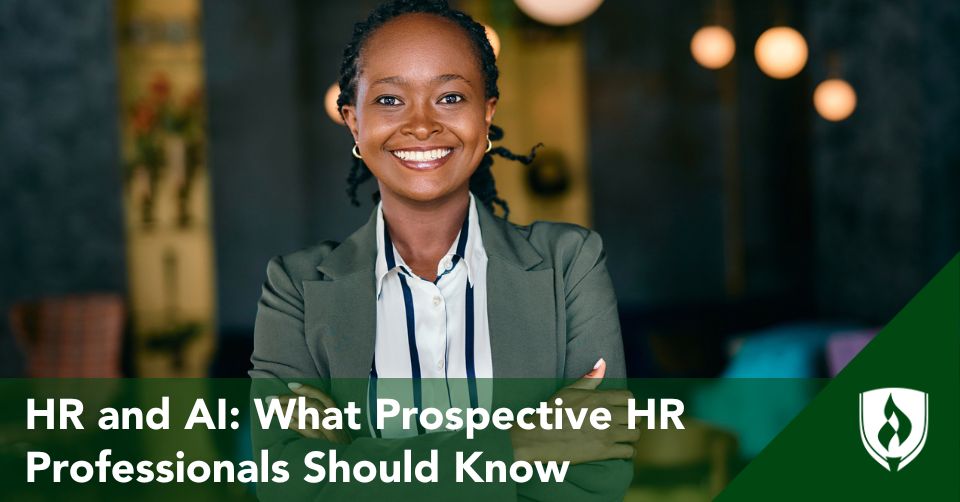
It’s no secret that artificial intelligence is changing how we live and work. But what does that mean for HR professionals right now?
The world of HR and AI is evolving fast, with new tools and systems popping up almost every day. These aren’t just futuristic ideas—they’re real solutions that are already making a difference.
From screening resumes in seconds to tracking employee performance in real time, AI in HR is helping businesses work smarter, not harder. If you work in human resources, understanding and using artificial intelligence can give you and your team a real advantage.
The rise of AI in human resources
Every part of the HR journey, from recruiting to performance management, is being transformed by new AI tools. These tools use machine learning to help HR professionals save time, make better decisions and focus on people, not just paperwork.
Let’s look at how AI affects every step of the HR journey.
Take Allen, for example. He just finished a graduate degree in human resources management and is excited to land his first role. When Allen applies for jobs, his resume is instantly screened by a machine learning algorithm. If he matches the company’s needs, an AI-powered chatbot invites him to a virtual interview. He meets with HR leaders at the company and does a great job.
The talent management software utilizes AI to to handle communications and scheduling. Even after he’s hired, Allen’s performance and engagement are tracked on an AI dashboard, giving both him and his manager real-time data and predictive analytics for training and growth.
Allen’s experience is what’s happening right now in many HR teams around the world. AI in HR is reshaping how professionals are hired, supported, and developed from day one.
How HR professionals are using AI today
So, how does this all look in action? Here’s what these changes look like for real HR teams using AI tools every day:
Using AI-driven chatbots to handle administrative tasks
One of the more common AI technologies is the chatbot.
AI-driven chatbots can answer common employee questions about benefits, PTO and company policies. Gone are the days when answering the same questions over and over via email was a primary HR function.
This tool takes care of repetitive administrative tasks and allows HR leaders to focus on developing training programs and working with their teams.
Automating resume screening with AI tools
Many companies rely on automated resume screening tools that sort hundreds of applications based on key job description criteria. For more on how that works, check out What is an ATS? Everything Job Seekers Need to Know.
Many of these tools utilize natural language processing to understand resumes and cover letters and rank applicants accordingly.
These AI tools save recruiters and hiring managers hours each week and help the company identify the most qualified candidates faster.
Improving employee engagement with predictive analytics
One of the growing AI capabilities involves predictive analytics tools to watch for early signs of employee disengagement and burnout.
A deep learning model can monitor aspects of performance and take in huge quantities of data to highlight warning signs in employee behavior, performance or workload.
With these data driven insights, leaders can create wellness programs and adjust workloads, improving employee engagement and preventing bigger problems.
Recruitment and talent acquisition
Recruitment is all about finding, hiring, and onboarding the most qualified talent. Today, AI tools are reshaping how companies reach candidates, manage job postings, and move people through the hiring process.
Generative AI tools can write job descriptions and create postings fine-tuned to reach the right kind of candidate in a fraction of the time.
With predictive analytics and candidate scoring, HR teams can make better decisions about who is most likely to succeed in a role.
All of these tools—often bundled into an AI-enabled applicant tracking system—save time, reduce time to hire, and improve the quality and efficiency of the recruitment process. AI is making it possible to fill open positions faster and with higher quality candidates, helping HR professionals stay competitive in a fast-moving talent market.
Faster performance reporting
Performance management is another area where AI is having a big impact. Instead of waiting for annual reviews, AI-driven systems now offer real-time feedback that helps employees see their progress and managers support their teams more effectively.
For example, let's say a top salesperson named Mike landed two major deals in just ten days. Because his manager, LaRae, uses an AI-powered dashboard, she saw Mike’s achievement right away. She sent him a personal message and recognized his success in the next team meeting, boosting employee engagement and morale.
In the same company, the AI system flagged a dip in Tyna’s call times and customer satisfaction scores. Usually, her supervisor, Quinn, would not have noticed this change so quickly, but with machine learning models tracking performance, the system suggested pairing Tyna with a mentor. This helped Tyna get support before the problem grew, improving her performance and the team’s results--and saving human resources personnel from needing to intervene.
These AI-powered HR processes mean no one is left behind, and managers can address small issues before they grow and celebrate wins as they happen.
AI solutions in rewards and compensation
AI is also transforming total rewards and compensation systems. A strong compensation package helps attract and keep the best talent, and AI makes it easier to manage this complex part of HR.
With AI-driven salary benchmarking and compensation analysis tools, HR leaders can quickly compare internal pay data to external industry standards. These systems use real-time data management and predictive analytics to flag trends like higher turnover among certain roles or changes in employee preferences for certain benefits.
For example, let's say a human resources professional named Riley manages compensation and benefits for a transportation company.
When turnover increased among mid-level drivers, Riley used an AI-powered salary tool to see that pay had fallen behind the market in their region. The same tool showed that more employees were using wellness stipends for gym memberships or mental health resources instead of traditional health plans.
With this data, Riley proposed a targeted salary adjustment and new benefits package to boost employee retention, satisfaction and morale. Instead of spending weeks on research, Riley and the HR technology team made these changes in a few hours.
Primary benefits of AI for HR professionals
No new technology is ever seamless. And change can be difficult. However, embracing AI can offer professionals in human resources many benefits in exchange for their efforts.
Saving time by automating administrative tasks
A huge benefit of AI in HR is how much time it saves on repetitive work.
Many HR professionals spend hours each week handling tasks like candidate sourcing, workforce planning, screening resumes, scheduling interviews or replying to the same employee questions over and over. Now, they can leverage AI tools and smart HR technology to automate these.
HR professionals can streamline administrative tasks, allowing them to take a more proactive approach to work that truly matters—such as building employee engagement, enhancing company culture, or planning new training programs. This shift not only boosts efficiency, it also helps HR teams focus on people, not just paperwork.
Making better decisions with real-time data
AI is a game changer when it comes to decision-making in HR. Instead of relying on gut feelings or outdated reports, AI systems provide up-to-date information and spot patterns in employee data that humans might miss. For example, predictive analytics can show which employees might be at risk for burnout, or help managers identify training needs before small issues become big problems.
With these insights, HR teams can make smarter choices—whether they’re hiring, setting pay or rolling out new benefits. By letting data drive their decisions, HR professionals can match people with the right roles, improve retention and support business goals more effectively.
Supporting equity and inclusion for all employees
One of the most important benefits of using AI in HR is its ability to help reduce bias and support fair treatment for every employee. When used correctly, AI can anonymize resumes, score applicants based only on skills and experience and flag any unusual patterns in performance reviews. This helps ensure that all employees get a fair shot—no matter their background.
However, it’s important for HR professionals to remember that AI is a tool, not a replacement for human judgment. The best results come when HR teams use AI alongside their own experience and values to make decisions that are both smart and fair. When this happens, AI helps create a more diverse and inclusive workplace where everyone can succeed.
Ethical considerations in AI for HR
AI brings new challenges and questions for HR professionals to think about. While AI systems can make HR work faster and more efficient, they also come with risks around data privacy, fairness and transparency. As more companies use artificial intelligence in human resources, it’s up to HR leaders to make sure these tools are used in responsible, ethical ways.
What happens if AI isn’t fair?
Not all AI tools are perfect. Sometimes, the data used to train an AI system can be biased, leading to unfair results.
For example, Molly is an HR leader who started using AI to help with hiring. After a few weeks, she noticed that male applicants ranked higher for tech jobs, while female applicants were more likely to be recommended for administrative roles. Molly dug deeper and found out the AI had been trained on outdated hiring data, where people often made biased choices.
She made the ethical decision to have the vendor retrain the model using more balanced and diverse data. After this change, she saw that qualified applicants were finally being ranked based on skills—not gender. This shows why human oversight is so important for fairness.
What about protecting employee data?
Another big question is how employee data is stored and used.
Let's say James, who manages HR systems in a global company, was careful to set up AI systems that included consent features and strong data privacy rules. He worked with his team to train managers on international data protection laws, so everyone knew how to handle personal information. James also made sure employees were told exactly why their data was being collected and how it would be used.
How transparent should HR teams be about using AI?
Employees want to know when AI is used in decisions that affect their careers like job offers, reviews or benefits.
Rochelle, an HR leader, made it a policy to always tell employees in writing when an AI tool was used to make an important decision. She also required that a real person review any AI-generated outcomes when employees raised concerns. Because of her approach, Rochelle’s team trusted both her and the new technology.
For every HR team, the message is clear: AI can be a powerful, invaluable tool, but only if it is used thoughtfully. HR professionals need to ask tough questions about ethical considerations and always put people first—making sure technology is there to help, not harm.
Why upskilling matters for human resources teams
Human resources professionals need to keep learning to stay ahead. As AI adoption grows and new HR technology becomes a bigger part of the job, building new skills is essential for every HR team.
Building data literacy: Jacob’s story
Jacob, an HR generalist in hospitality, saw that understanding data would help him make better decisions and advance in his career. He enrolled in an HR analytics and data visualization course, where he learned to read reports about predictive models, turnover trends, hiring patterns and employee engagement. By building his data literacy, Jacob became more valuable to his team and improved his future job options.
Gaining tech fluency: Claire’s story
Claire is still a college student, but she knows that tech fluency is critical for HR professionals in today’s world. She took AI courses and joined webinars focused on new HR technology. This gave her the confidence to land an internship in her university’s HR department, where she worked on payroll automation and benefits analysis. Claire’s tech fluency made her stand out from other applicants and helped her succeed in her new role.
Practicing strategic and critical thinking: Nicole’s story
Nicole is a recruiter at a healthcare employment agency. She used to rely on her instincts when reviewing resumes. After learning about AI in HR, Nicole started using candidate ranking algorithms and spotted hidden bias in job descriptions. Her hiring decisions became more fair and effective, and her results improved. Nicole shows how strategic thinking and critical thinking help HR professionals use technology wisely and make better choices.
Skills for HR professionals
To succeed in today’s workplace, HR professionals need a mix of people and tech skills. Here are some top skills to focus on:
- Data literacy: The ability to read, understand, and use workforce data for smart decision-making.
- Tech fluency: Being comfortable with new HR tools, dashboards, and AI-powered platforms.
- Strategic thinking: Connecting HR work to business goals and planning ahead.
- Critical thinking: Asking questions, looking for bias, and using both data and your own experience to make decisions.
Upskilling in these areas will equip HR professionals to lead the way as AI changes the field.
The future of HR and AI
AI is here to stay in HR. As more organizations rely on artificial intelligence to handle everyday tasks, the role of HR professionals is changing too. From talent management to performance reviews, AI in HR makes it possible to work faster, find better solutions, and create a workplace where people can grow.
But these tools aren’t just about technology—they’re about people. The most successful HR professionals will use AI with care, strategy, and heart. By learning how to use these systems wisely, you can make your team stronger and your company a better place to work.
In the future, the best HR professionals will be the ones who know how to blend people skills with smart use of AI. Far from replacing the need for these roles—AI can allow human resources to get back to the more...human stuff. Check out HR Experts Explain the Importance of Human Resources Management.




